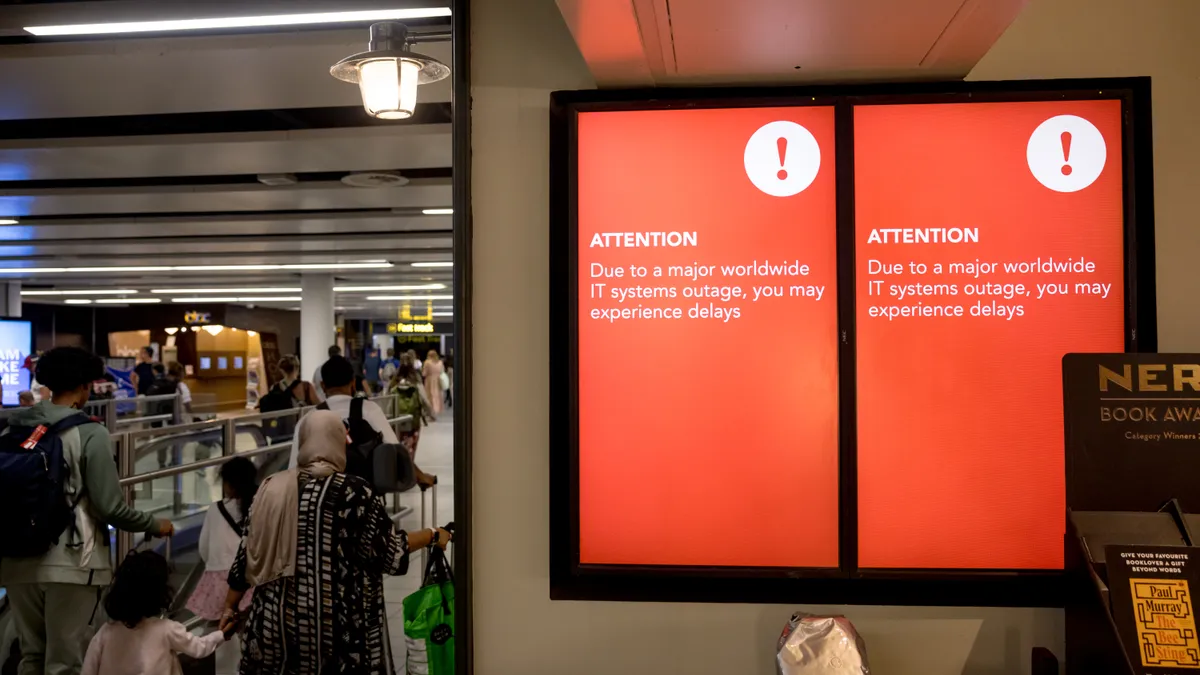The tech conference of the future will differ from anything industry's seen before.
Technologists eager to connect in real life might be filing into hundred-person venues instead of massive conference halls, with temperature checks at the gate and enforced social distancing.
Presentations will be broadcast the world over to a larger user base.
The stadium-sized forums and handshake-fueled connection frenzies are unlikely to make a swift return, according to tech event experts and executives. Instead, companies will continue to explore new formats that blend the physical and digital world, in an attempt to recoup the connections missed at events that won't happen.
Microsoft's directive regarding in-person events is an example of how other companies could adapt. Microsoft is moving all in-person events — public and internal — to the digital realm until July 2021. Salesforce will also flip all in-person conferences to virtual arenas for the rest of 2020 — including its flagship conference, Dreamforce.
In the long-term, these moves respond to technologist's sentiment regarding non-essential travel as well as guidance from local and state authorities. As the COVID-19 pandemic evolves, 71% of IT leaders say they wouldn't feel comfortable attending an event, according to data from Pulse.
The large-scale conferences of the future may look more like a blend of physical and virtual happenings, according to Carolyn Dawson, managing director of Informa Tech, in an interview with CIO Dive.
Dawson, who has worked to organize and manage global tech conferences for 20 years, said a number of potential modifications could await conference goers:
- All-digital, contactless registration
- Larger rooms for smaller audiences to allow for social distancing
- Temperature checks at registration — and the associated privacy concerns
- Modifications to stage timing to reduce the size of crowds
- Changes to exhibitor booths and tables to control access
In the meantime, it's up to businesses to creatively replace the touchpoints the pandemic took away.
The advantage lost to coronavirus
Annually, Informa Tech — the firm behind conferences including London Tech Week and Black Hat — hosts around 160 events ranging from 100 to 50,000 attendees.
By March, the company knew physical conferences prior to June needed to be postponed until, at least, the second part of the year. Scheduled to take place in Las Vegas this summer, Black Hat switched over to a digital format Monday, as did DEF CON, the cybersecurity conference that immediately follows Black Hat.
"We thought the COVID situation would blow over," said Dawson. "What's showing now is that it isn't going away any time soon. The complexity of organizing and running events is a lot more challenging and will be for some time to come."
In-person conferences provide companies with an ample supply of leads, opportunities for face time with stakeholders and spontaneous connections that might turn into contracts. It's a lot harder to replicate those moments completely in a virtual environment, said Dawson.
While online events can help showcase a company's toolkit or the knowledge of its team members, the challenge for organizers is drawing a direct line between a webinar and revenue.
Loss of "coincidental business," is the first casualty of this shift to the digital world, said Geeman Yip, founder and CEO of BitTitan. The loss of in-person events means it's harder to randomly meet a potential customer.
"I can't accidentally bump into you online," said Yip. "When that accidental business goes away, that has to be made up somehow."
Given the recession analysts are projecting analysts are projecting, businesses will reap the benefits of lower investments in event sponsorships and attendance. However, they risk missing out on revenue that accidental connections would have provided.
Long-term, it's unlikely companies can fully replace value of physical events with their virtual counterparts, said Dawson. But as experts continue caution against mass gatherings, it's up to organizers to find the benefit for communities.
A pandemic game plan
Assuming industry conferences will return to what they looked like before the pandemic is a recipe for disaster, experts say. A lack of planning can mean sunken investments for companies — and missed connections for hopeful attendees.
By March 3, it was clear Okta's yearly conference, Oktane, wouldn't get 6,000 people under the same roof on April 1.
Organizers spent the next four weeks flipping all elements of the conference, including keynotes and breakout sessions, online.
"We didn't just want to have content on a website, we wanted to make sure we could still bring people together in a way," said Alyssa Smrekar, senior director of corporate marketing at Okta.
Through videoconferencing, the company tried to make experts and exhibitors available to attendees virtually, in order to spark some of the connections usually taking place at a large conference. The ability to ask questions during a talk gave attendees an extra layer of engagement.
A virtual substitute for a physical conference can minimize disruption, as it lets the focus shift to the content. But attendees must be ready to adapt, said David L. Cherry, corporate event planner, meeting specialist and conference operations.
"In this current climate, planners will need to think of ways to keep attendees engaged virtually," Cherry told CIO Dive. "The mindset of the average participant will need to shift also to focus, through the distractions, dive deeper into engagement and networking virtually."
One example of finding a creative alternative to the traditional venue was Deserted Island DevOps, a livestreamed event that took place entirely within the universe of Nintendo's "Animal Crossing" on April 30.
"The aesthetic is something I think was very appealing to people," said Austin Parker, principal developer advocate at LightStep. "It's a very cute game, and that goes to the ethos of what people are looking for right now. People want something that feels a little cute, a little safe. Almost like popcorn, something you can sit there and chow down on."
Until the risk drastically subsides, organizers will continue to think outside the box to gather their communities, Parker said.























